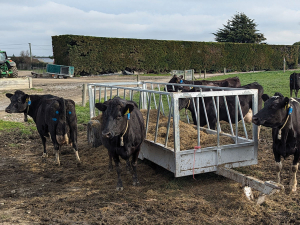Low-footprint feed drives high-profit, low-emissions dairy
The key to a dairy system that generates high profit with a low emissions intensity is using low footprint feed, says Fonterra program manager on-farm excellence, Louise Cook.
 Transitioning cows showing the wearable collars which will help the farm manage a new “tactical milking” regime this season.
Transitioning cows showing the wearable collars which will help the farm manage a new “tactical milking” regime this season.
An early adopter of a 10-in-7 variable milking regime, the Lincoln University Demonstration Dairy Farm (LUDF) is tweaking the system this season in search of further boosting farm performance and profitability.
Partnership & demonstration lead Antoinette Archer says the farm is adopting a “tactical milking” system that considers individual cow needs and can flex to seasonal and management triggers.
LUDF’s involvement in monitoring programs, comparing data from wearables and productivity, has aided researchers in providing farmers with more informed guidelines at an individual cow level, she said.
The farm will initially milk transition cows (post calving) once-aday (OAD), monitoring rumination as a predictor of post-calving recovery.
When transition cows meet rumination criteria they will shift to twice-a- day (TAD) milking to support peak milk production.
Archer said that Increasing milking frequency early in the season drives milk production and pasture demand at a time where pasture growth is at its maximum.
“The goal is to ensure we harvest as much pasture as possible, which sets the farm up for an increased feed conversion efficiency, which will improve the farms outcomes for efficient and profitable milk production.”
LUDF will maintain milking frequency flexibility by moving to a 3-in-2 or 10-in-7 milking regime, post mating, depending on the animal and people conditions during the season. For the animals, the triggers to adjust milking frequency will include body condition score, and weather conditions, including heat or prolonged wet periods.
Archer said the “people triggers” would consider staff needs and distribution of workload. “These triggers offer flexible management levers to optimise milk production, animal health, and environmental outcomes, while looking after our people.
“The rationale behind this approach is rooted in generating more profitable and environmentally friendly milk, with a focus on reducing greenhouse gas intensity - measured through FPCM – and supporting feed management during peak growth.
“This strategic shift aims to provide resilience against seasonal challenges, support animal performance, and help meet our environmental targets and commitments.”
LUDF will also return to a two-herd system, which will enable targeted care of animals with divergent requirements and give management additional flexibility ensure our reproductive performance and animal welfare targets are achieved.
2021-22 was the first full season of ten-inseven variable milking on the farm, milking twice a day three days a week but only once a day otherwise. Small losses in production were expected to be offset by various gains including energy and labour costs, while bringing significant gains in staff and herd welfare.
At that time, they expected a 6% drop in production due to the variable milking regime. Archer said that the actual recorded drop averaged 8.4%, but that was across a period with three unusually wet seasons when even farms continuing conventional twice a day milking also suffered production decline. Benchmarking against a sample of those farms showed they recorded drops of 3.2% - suggesting LUDF’s weather adjusted production drop was only 5.2%.
Archer said the South Island Dairying Demonstration Centre (SIDDC), the partnership that runs the farm, will elaborate on the changes at an upcoming Focus Day on October 8. The focus day will also hear insights from an Emissions and Profitability Project that has been running in conjunction with Fonterra, DairyNZ and LIC.
Farmers are being encouraged to take a closer look at the refrigerants running inside their on-farm systems, as international and domestic pressure continues to build on high global warming potential (GWP) 400-series refrigerants.
As expected, Fonterra has lifted its 2025-26 forecast farmgate milk price mid-point to $9.50/kgMS.
Bovonic says a return on investment study has found its automated mastitis detection technology, QuadSense, is delivering financial, labour, and animal-health benefits on New Zealand dairy farms worth an estimated $29,547 per season.
Pāmu has welcomed ten new apprentices into its 2026 intake, marking the second year of a scheme designed to equip the next generation of farmers with the skills, knowledge, and experience needed for a thriving career in agriculture.
One team with 43 head, including a contingent from Mid Canterbury, are reflecting on a stellar NZ DairyEvent.
Fonterra farmer shareholders have approved the mechanism for a $2/share capital return expected from the sale of its global consumer and associated businesses.
OPINION: Staying with politics, with less than nine months to go before the general elections, there’s confusion in the Labour…
OPINION: Winston Peters' tirade against the free trade deal stitched with India may not be all political posturing by the…